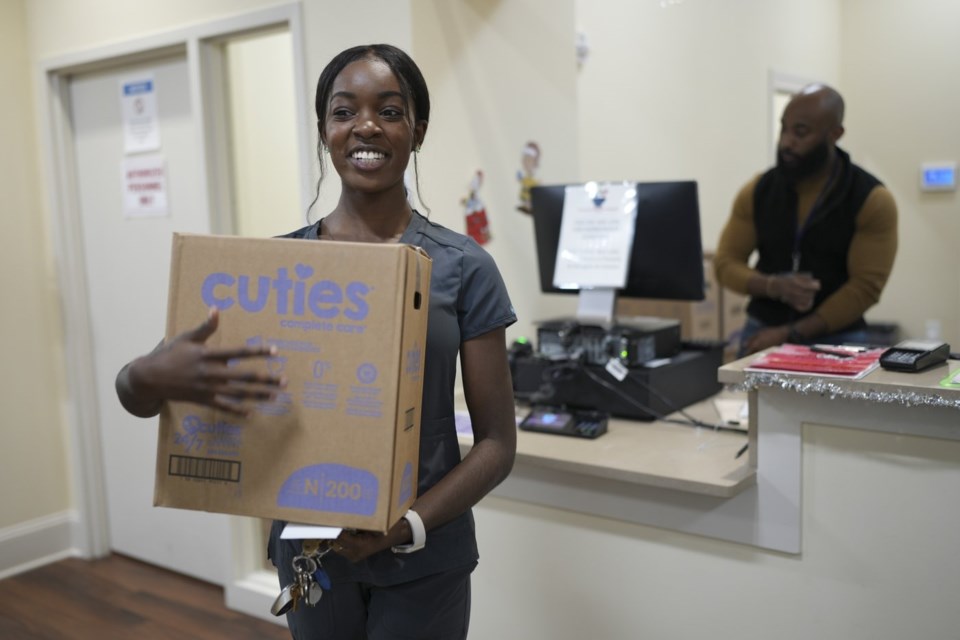MEMPHIS, Tenn. (AP) — States with restrictive abortion laws generally have more porous safety nets for mothers and young children, according to recent research and an analysis by The Associated Press.
Tennessee is an example of how this plays out. Tennessee residents of childbearing age are more likely to live in maternal care deserts and face overall doctor shortages. Women, infants and children are less likely to be enrolled in a government nutrition program known as WIC. And Tennessee is one of only 10 states that hasn’t expanded Medicaid to a greater share of low-income families.
The AP reported on how safety net programs in Tennessee and states with similarly strict abortion laws often fail families. Here are some key takeaways.
Medicaid doesn’t cover as many low-income residents
The Republican supermajority in the Tennessee legislature has long rebuffed efforts to expand Medicaid to people earning up to 138% of the federal poverty level — about $35,600 for a family of three.
Earlier this year, a federal judge ruled TennCare — the state's Medicaid program — unlawfully terminated coverage for thousands of families and had a “lethargic” response to nearly 250,000 children losing coverage because of paperwork problems.
Republican Gov. Bill Lee argues that his administration has enhanced services. For example, it boosted its Medicaid coverage for mothers in 2022 from 60 days postpartum to one year, which allowed an additional 3,000 moms to use the program each year.
The state also raised the Medicaid income limit for parents to the poverty level — — and began offering recipients 100 free diapers a month for babies under two.
“Pro-life is much more than defending the lives of the unborn,” Lee said in his 2023 annual address to lawmakers and echoed more recently on social media. “This is not a matter of politics. This is about human dignity.”
Safety net programs can be difficult to navigate
Moms described several aid programs as rife with red tape and other challenges.
Anika Chillis of Memphis was on WIC for several months after her son was born, but then went without because of mistake during the renewal process — eventually getting it restored with help from the nonprofit Tennessee Justice Center.
Taylor Cagnacci of Kingsport, who is pregnant and has a 1-year-old, said she was on the federally funded Supplemental Nutrition Assistance Program — formerly known as food stamps — for a while but missed an appointment and was unclear about the steps after that. The process to get recertified was “such a headache” that she’s going without SNAP.
“I just felt like it was purposely being made difficult so that I would just give up,” she said.
The issues extend beyond Tennessee. Women with young children in states where abortion is banned or limited to early weeks of pregnancy said it can be tough to get social services there, according to a by the health policy research organization KFF. Nearly half said it’s difficult for women in their state to get food stamps, for example, compared with 3 in 10 in states where abortion is generally available.
Charities can't fill the gap
Of Tennessee’s 2.8 million households, 30% earn above the poverty level but not enough to afford the basic cost of living in their counties, according to a . Often, they don’t qualify for government help.
A fragmented patchwork of charities can help, but they don’t cover the entire state. Some nonprofits are hindered in helping by government agencies’ income rules. And most charities are constrained by the ebb and flow of donations.
Nonprofit leaders fear that safety net gaps may grow with a new administration in Washington and a GOP-controlled Congress. Republicans could seek significant changes to federal assistance programs they’ve long criticized, like Medicaid and food stamps.
“We’ve been through four years of a Trump administration, and the goal under the Trump administration was to cut social services,” said Signe Anderson, the Tennessee Justice Center's senior director of nutrition advocacy. “I’m concerned … for families in Tennessee and across the country.”
___
Kruesi reported from Nashville, Tennessee. AP data journalists Kasturi Pananjady and Nicky Forster contributed to this report.
_____
The Associated Press Health and Science Department receives support from the Howard Hughes Medical Institute’s Science and Educational Media Group and the Robert Wood Johnson Foundation. The AP is solely responsible for all content.
Laura Ungar And Kimberlee Kruesi, The Associated Press



